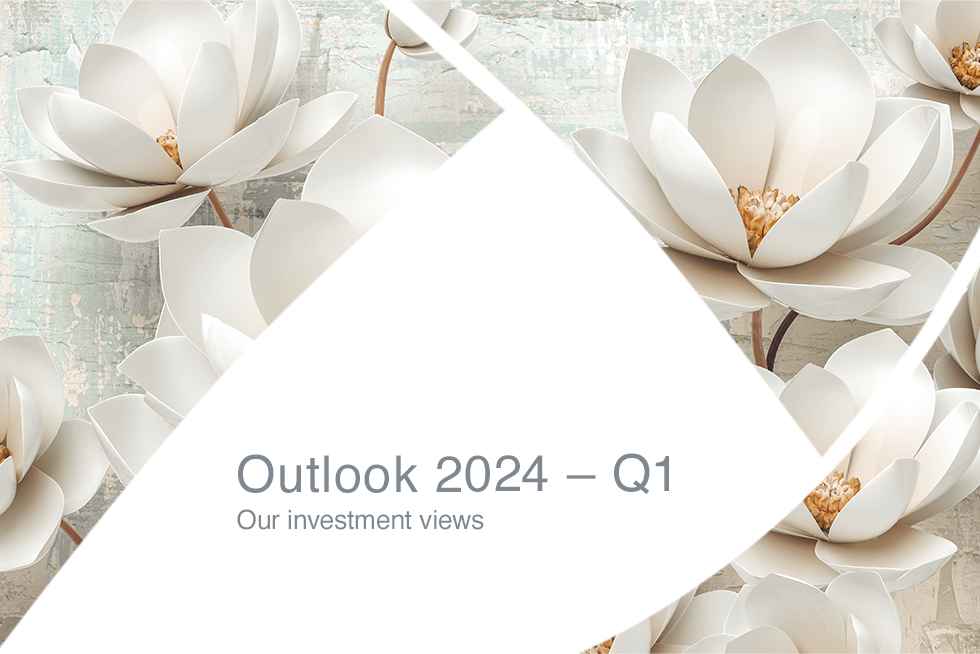Economy
The year ahead promises equal parts complexity and opportunity. The global economy grapples with inflation’s resurgence, shaping central bank policies across continents. Western economies’ resilience amidst rising rates is noteworthy, though the victory over inflation remains an unfolding story. Fiscal policies, particularly in the US and Europe, continue to play a pivotal role, but the sustainability of such spending is under scrutiny. Consumer behavior and labor market trends are key indicators that will guide our understanding of economic health. Furthermore, geopolitical developments, especially in regions like Ukraine, Taiwan, and the Middle East, add layers of complexity, influencing market sentiments and economic policies. Another significant theme is the impact of Artificial Intelligence (AI) and technology on economic structures. The rise of AI, especially in enterprise adoption and healthcare innovations, is set to redefine market dynamics and investment opportunities.
Equities
Equity markets in Q1 2024 are poised at a juncture shaped by corporate earnings, inflation trends, and central bank policies. A strategic focus on quality stocks, robust balance sheets, and adept management is our recommended path. Diversification between growth and value stocks is crucial. Regional dynamics play a significant role, with European equities potentially offering attractive opportunities relative to US stocks, with a P/E ratio for S&P 500 and Eurostoxx 50 respectively at 22 and 12. Emerging markets like India and Brasil are set to benefit from the reconfiguration of global supply chains, revealing unique investment avenues and positive commodity cycle. The technology and healthcare sectors, driven by innovation in AI and medical technology, are key areas of growth in our point of view.

Fixed Income
In fixed income, we are navigating a path influenced by central banks’ positions on interest rates. A cautious approach to rate cuts underpins our strategy. We see a trend towards investment-grade corporate bonds, which offer protection against economic downturns. Sovereign bonds in the major developed countries appear to be attractive investment opportunities compared with their peripheral counterparts. However, we prefer corporate bonds.
Corporate bonds are facing higher interest costs globally and potentially refinancing problems in the high yield segment. In emerging markets, the debt landscape offers a mix of opportunities and risks, shaped by geopolitical and monetary factors. Overall, we prefer to allocate more capital to higher quality bonds and expect a future opportunity in long-term high yield.
Alternative investments
In the current interest rate environment, our approach remains focused on carry strategies through bonds. We thus maintain an underweight allocation to alternative investments, capitalizing on the stability and predictable returns offered by bond instruments. Nevertheless, we remain attentive to opportunities offered by alternative assets, given their potential for returns uncorrelated with traditional markets.
You may also like
Banksy: from the street to the art market
A street artist as enigmatic as he is provocative, Banksy made a sensational entry into the world of contemporary art and has never ceased to amaze. Originally from Bristol, England, his true identity remains a mystery, adding another element of fascination to an already captivating body of work.
Bonds in 10 points
For those of you looking to find out more about bonds, this article provides you with a basic understanding of this asset class and the factors influencing its price.
Whom to Entrust with Wealth Management in Switzerland?
Switzerland continues to offer some of the best expertise in the world for wealth management, but the complexity of tax laws and the volatility of international financial markets can make this a challenging endeavor.




